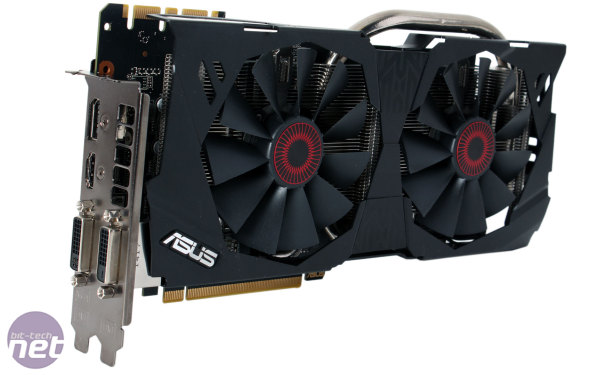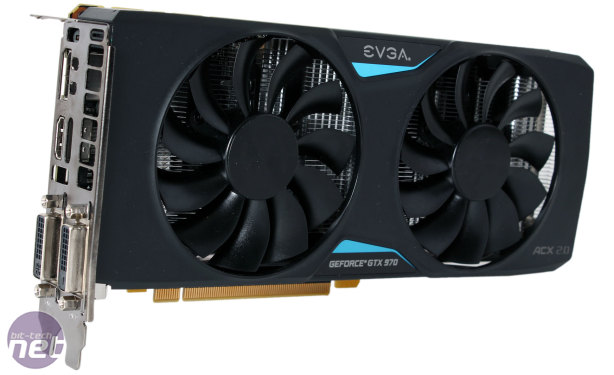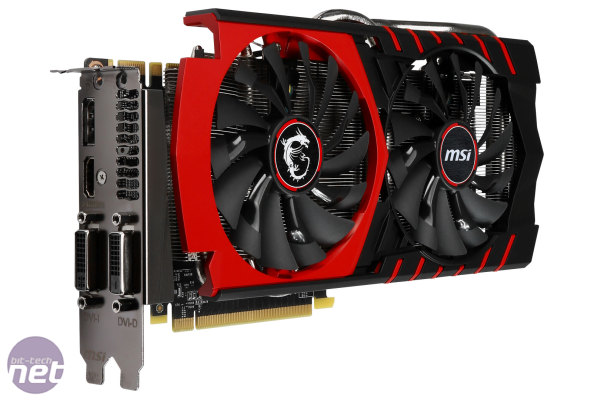Nvidia GeForce GTX 970 Review Roundup: feat. ASUS, EVGA and MSI
September 19, 2014 | 16:56

Performance Analysis
The first thing to note is that the three cards are almost always ranked by order of their stock clock speeds, which obviously comes as no surprise. As such, EVGA is usually leading the way, with MSI in the middle and ASUS at the tail end. That said, as the difference in base clock between the EVGA and ASUS card is only 51MHz, the performance differences mostly insignificant, rarely adding up to more than 1 or 2fps.In Battlefield 4, all three cards are able to sustain 60fps at maximum settings at 1080p, beating both the R9 290X and the GTX 780 which are more expensive cards. The lead over the latter card is maintained at higher resolutions, but the R9 290X takes over all three at 1440p and 4K. Impressively, all three cards also meet the “technically playable” 25fps cut-off at 4K, though you'd definitely want to dial the settings down a little for a more enjoyable experience. The best part, however, is that as far as minimum frame rates go, the significantly more expensive GTX 980 very rarely as an advantage that exceeds 10 percent.
In BioShock Infinite the trio of overclocked GTX 970 cards leave the R9 290X and the GTX 780 behind them (at 1080p, even the GTX Titan Black is beaten), and this continues all the way up to 4K, where all three manage to stay above 30fps for relatively smooth frame rates. They all pass the 60fps minimum test at 1440p too. The GTX 980 has a slightly more tangible advantage here usually between 12 and 15 percent, though this still isn't exactly spectcular.
Crysis 3 is one test that splits the three cards a bit more than usual, with the EVGA's clock speeds netting it 7 and 9 percent better minimum frame rate than the ASUS one at 1080p and 1440p respectively. Higher clock speeds definitely seem to make a bigger difference here than elsewhere, as the slower ASUS also drops below the GTX 780 and can only match the R9 290 at 1440p. 4K is still beyond the realm of any single GPU in this game (at least at full settings), but the cards do manage to sustain more than 30fps at 1440p. Once again, the GTX 980 is never all that far ahead either.
Skyrim is no issue for any of the cards at any resolution. However, one oddity is the 4K result, as the best of the three only manages a 49fps minimum, which leaves both the R9 290 and the GTX 780 ahead, albeit only just.
The MSI and EVGA cards are neck and neck in Unigine Valley at both 1080p and 1440p, indicating that their actual boost clocks are very similar despite their nominally different base clocks. Indeed, we saw both cards averaging around 1,300MHz under sustained load, while the ASUS card was hovering closer to 1,250MHz. This 4 percent difference is highlighted perfectly by the Unigine results at both resolutions. The GTX 980, meanwhile, again only manages to beat the best GTX 970 card by 12 percent.
As we expected after the GTX 980 review, the power consumption figures are impressively low. With its single power connection and the lowest clock speeds, the ASUS has the lowest result, taking our system power consumption to just 278W, below the level of even the GTX 760, which it beats by almost 60 percent in Valley, for example. It's also only a few watts more than the consumption of the R9 270X, which whose performance it more than doubles in the same benchmark. As we've said before, Maxwell is seriously efficient stuff. Next is the EVGA at 293W with the MSI being the least efficient of the three at 309W. This is actually a touch higher than the GTX 980, though it does have that 8-pin PCI-E connection as well as higher clock speeds.
Temperatures for all three cards are great, with delta T results below 50°C in every case. The MSI and ASUS cards are the best two (the seemingly high idle results are due to the fans entering passive mode), and their coolers are also the quietest – under load, both were virtually inaudible. EVGA's cooler isn't quite as effective, and is a touch louder too. This is to be expected given its smaller dimensions, and to be clear it's still a quiet cooler – air noise won't be a distraction using this card.
What may be a distraction, however, is noise from the power circuitry. As we said, EVGA doesn't use any upgraded components for its power phases, whereas ASUS and MSI both use higher end parts. It also has only four power phases for the GPU compared to six in the other two cards, which puts more strain and load on the invidiual elements of each phse. The result, sadly, is a relatively low volume but still irritating buzzing noise every time the card is put under load (i.e. when gaming). In a quiet case positioned on the floor, or when using headphones, it won't bother you, but if your case is next to you on your desk then that may not be the case. No power noise was heard from the ASUS or MSI cards.
The overclocking credentials of all three cards is great – seeing standard air cooled cards running easily at over 1.4GHz is pretty awesome. Even better is how close the cards are able to get to the GTX 980's performance. In Battlefield 4, the EVGA and ASUS models match it on the minimum at 1440p, though lose out on the average, while the higher MSI overclock actually sees it overtake the flagship model. In Crysis 3, this isn't possible, though the EVGA and MSI cards come close, overtaking the GTX Titan Black and GTX 780 Ti in the process. In Valley, it's very close again, and the MSI card trumps the GTX 980 another time. Power consumption does increase when overclocked of course, with the MSI reaching 351W. However, temperature and fan speeds are relatively constant – no card was noticeably louder or hotter when running at these higher frequencies.

MSI MPG Velox 100R Chassis Review
October 14 2021 | 15:04











Want to comment? Please log in.